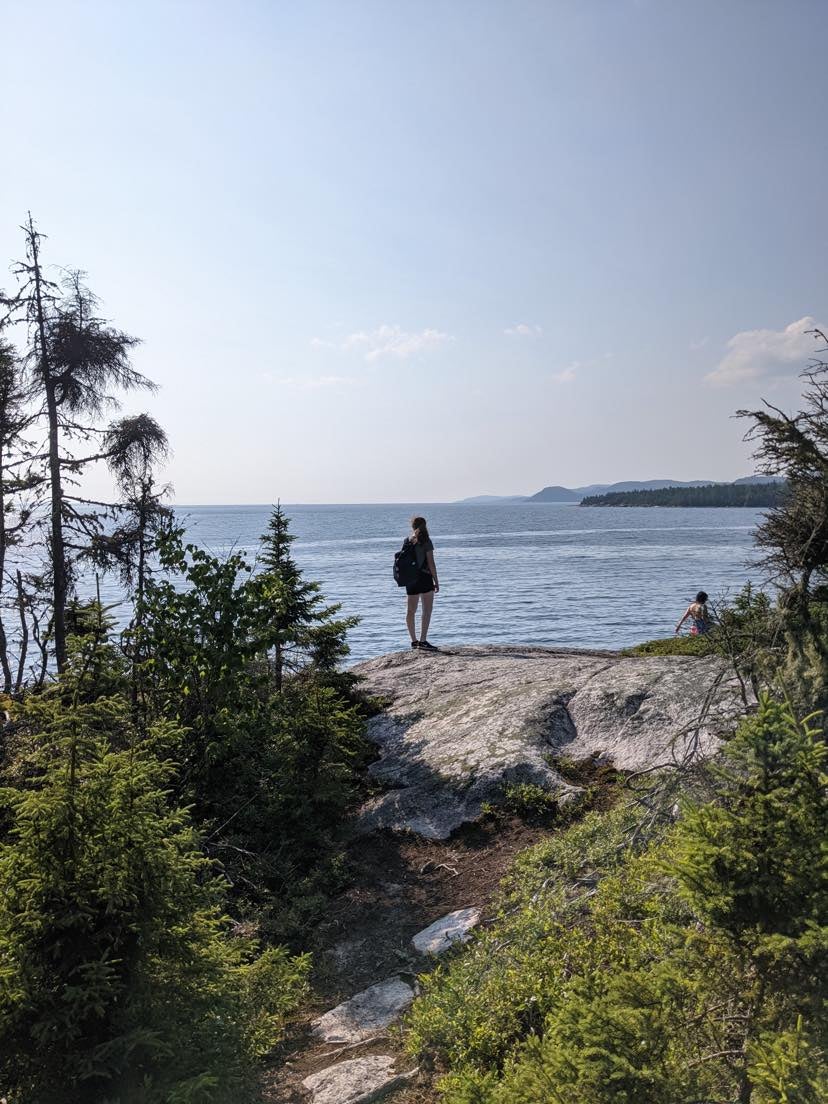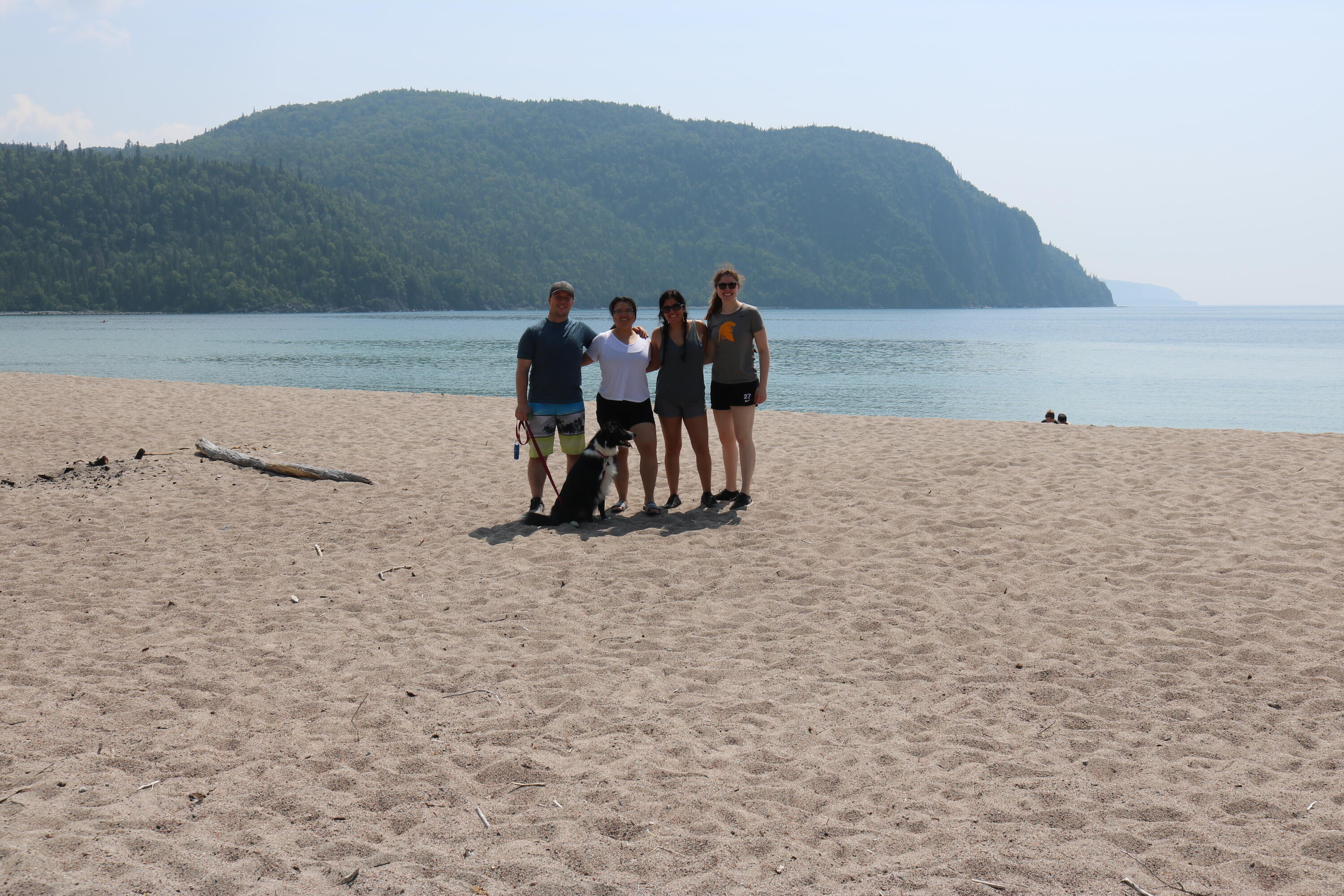Tegan Odland, Rx2021 - Sault Ste. Marie
 Navigating
the
region
Navigating
the
region

There was so much to like about Sault Ste. Marie. First and foremost, each of my rotations was a great learning experience. All three rotations were very clinical and I now feel so much more prepared to work independently as a pharmacist in whatever setting I choose.
I also loved living in the Algoma region. There were so many beautiful hikes and places to see within a short drive from Sault Ste. Marie. Once it was warm enough, my classmates and I got to explore new places almost every weekend. I honestly could have spent another 6 months in the Soo just exploring everything the region had to offer.
I also found that Sault Ste. Marie was a great city for clinical rotations. It wasn’t rural, but also wasn’t big enough to feel overwhelming. The cost of living was low and there was a minimal commute to each of my rotations. The city was easy to navigate and provided everything we needed while also allowing easy access to outdoor adventures.
I love hiking and spending time in the outdoors, and Sault Ste. Marie provided plenty of opportunities to do so. My classmates and I spent many weekends exploring the Algoma Region, visiting beautiful places such as Lake Superior Provincial Park, Pancake Bay, Bathtub Island, and Aubrey Falls.
Housing in Sault Ste. Marie was very affordable. Two of my classmates and I ended up renting out an entire house for the full 6 months of rotations. Apartments were also available for rent. Since there are a few post-secondary institutions in the city, there were also opportunities to rent a room and live with students attending those schools.
I had a car while I lived in Sault Ste. Marie, so I didn’t really use public transit. However, one of my classmates often took the bus and found it easy to travel between her different rotations. Sault Ste. Marie provided the advantage of having rotations very close together – all 3 of my rotations were within a 10-minute commute of my house.
I had a great experience with my Regional Clinical Coordinator, Tracy McCoy. Tracy took the time to speak with us in order to match us to rotations that best suited our interests. I ended up with great experiences in three very different settings (hospital, primary care, and community).
Tracy checked in with us frequently to ensure that our rotations were going well. She encouraged us to make the most out of each rotation, and organized virtual meetings for the group where we could share advice with one another. I also really appreciated that Tracy advocated for us to receive our COVID-19 vaccines along with other front-line hospital staff.
Even before rotations, Tracy supported us by sending material to prepare us for our hospital placements and by helping us to find housing. Throughout our rotations, Tracy was accessible and willing to support us in any way necessary. She also provided some helpful suggestions for great restaurants and hikes in the Soo!
 Practice
site descriptions
Practice
site descriptions

Group Health Centre Pharmacy: This pharmacy is located in the same building as many local family doctors’ offices. Pharmacists have access to an internal messaging system with these physicians which allowed for great interprofessional collaboration. I was provided opportunities to practice to my full scope including conducting MedsChecks, adapting and renewing prescriptions, working up complex patients, and administering injections.
Sault Area Hospital, renal ambulatory clinic: Some of my main responsibilities here were providing epoetin alfa education and monitoring, completing pharmacotherapy work-ups of hemodialysis patients, and answering drug information and clinical questions from the renal team. My interprofessional colleagues included nephrologists, nurses, dietitians, and a social worker.
Sault Area Hospital, two medical inpatient units: Here, my role included medication reconciliation, pharmacotherapy work-ups, and solving specific drug therapy problems as requested by physicians or as discovered by pharmacy staff. I played a role in vancomycin monitoring, VTE prophylaxis, discharge counselling, and coordinating care with community pharmacists. In this rotation, I worked closely with hospital physicians and nurses. I communicated almost daily with physicians to make recommendations and I found that they were very receptive to my suggestions.
I developed so many essential skills while on rotations in Sault Ste. Marie. One of the most important was clinical decision-making. My rotations presented me with so many different patients and clinical problems, allowing me to repeatedly practice using all available information and resources to make the best possible decision. I learned to navigate within more difficult and unclear scenarios involving complex topics such as QTc prolongation risk. The ability to make clinical decisions independently is something that will be extremely valuable in my career as a pharmacist. Other skills that I developed on rotations include the ability to independently communicate with other healthcare providers, to complete therapeutic prescription checking, to answer drug information questions, and to complete full pharmacotherapy work-ups of complex patients.
I also solidified my knowledge in many different clinical areas. I was especially grateful for the opportunity to build familiarity with more difficult topics such as IV antibiotics, VTE prophylaxis, and interpreting lab values.
One final asset that I gained from my patient care rotations was confidence in all of the knowledge and skills that I just discussed. I worked closely with very supportive preceptors who helped me reach the point of feeling ready to practice independently as a pharmacist.
My RCC and preceptors were a great source of support throughout rotations. One thing that I really appreciated was that my preceptors sent me rotation-specific resources that helped me fulfill my responsibilities. For example, while I worked in the renal clinic, I was provided with an algorithm for monitoring epoetin alfa and a handbook for dosing medications in hemodialysis patients.
 Advice
for
future
students
Advice
for
future
students

First of all, you know more than you think you do! I was really nervous about starting rotations, but quickly discovered that I was prepared than I felt. And when I didn’t know something, I found that my preceptors were very supportive and helpful. I think it’s important to remember that you don’t need to know everything before starting rotations – you always have access to library resources to find any information you might need.
One of my biggest suggestions would be to be willing to work independently. Try to solve a problem or answer a question on your own first, then run your plan or answer by your preceptor as a double check. This really helped me to become more confident in working on my own, especially when my preceptors came up with the same solution that I did!
Finally, make the most of your last 6 months of university! Take the time to get to know the other students in the region – our adventures were so much more fun together. And be willing to take some time off studying to see everything your region has to offer!
I would encourage students to consider taking the leap to doing their rotations a little further away from home because I had such a great experience in Sault Ste. Marie! Six months goes by much faster than you’d think. My rotations taught me so much more than I expected, and I really enjoyed exploring this beautiful region!